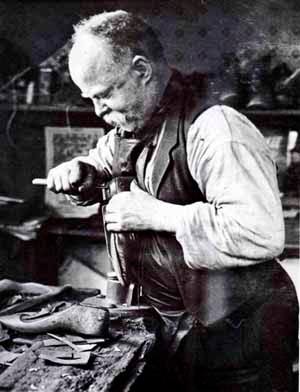
List of Trades from Wiki. Some still relevant, others not so much.
The idea for this, number 10 on the livability indicator list, struck me of all places when watching an episode of Curb Your Enthusiasm. I don’t recall the specific scene, but as I remember Larry had something go wrong (as with every episode) and a friend or acquaintance was able to quickly fix the problem because of his families history in whatever trade, I think it might have been as Cobblers or Dry Cleaners or something similar.
The point is that these tradesmen (or women) are the small, independently owned businesses that provide the backbone for neighborhoods. They are often well-known individuals within their communities and form part of the strong middle-class that democratic republics require for existence.
What got me thinking, was that we really don’t know how to do anything ourselves anymore. We don’t know how to fix our shoes (or have anyone in our neighborhoods to provide such a service), re-stitch our clothes, fix our toasters…as Prop Joe says in a particular powerfully subtle scene in Season 4 of The Wire [paraphrasing from memory]:
“you know the problem with these here toasters…there’s no point in having them fixed. Why not just throw them out and get another.”
~Joe speaking metaphorically to a drug running, convenience store owning frontman.
The point is that the world of planned obsolescence and cheap, replaceable goods has cut out a significant stabilizing force in our society: the butcher, the baker, and the candlestick maker. These are often family trades, with acquired, and very specialized knowledge passed on throughout the generations, at least until recently. These middle class families began sending their kids to college where they could leave the family trade for supposed better lives pushing paper on Wall Street.
Many of these still exist in the denser cities along the coasts and overseas, which to Larry David’s Brooklyn sensibilities seemed perfectly fine for the rest of the country to understand, which in actuality only exist on the big screen for them. How many go to the local deli or the chain grocery? How many people of our generation have ever heard of a haberdasher except as some funny sounding word that we heard in The Departed, not coincidentally set in Boston, a city in many ways still very much old world?
Well, guess what. We are too poor (or at least too in debt) as a people to keep throwing everything away (and we’re running out of places to throw things! Next stop, Space!). It’s time for us to relearn how to reuse and repair things rather than just replace them.
[The glee of replacing cultural amnesia with skilled knowledge]
As a side note, there is a lot of discussion about Dallas needing ground floor retail, as some sort of panacea. Well, obviously it doesn’t work everywhere (usually only in the busiest areas of the movement economy – regardless of the dominant form of transportation). But, these are the types of ground floor uses that activate street life when their isn’t the density or activity necessary for more vibrant retail users/tenants/commerce. Furthermore, these families and tradesmen are also the strong presences in the community of the Jacobsian tradition that bind and help form a collective stewardship for our neighborhoods and the people within them.
Once density begins to return to our cities, I foresee lots of opportunity for startup businesses along these lines.
———————–
edit: coincidentally, I just stumbled upon this article discussing the distressing future for retailers:
Experts expect thousands of stores to close in ’09
While it’s something that she believes is “unavoidable” and will hit the economy in terms of more job losses, she hopes it will also change the consumers’ buy-at-all-cost shopping mentality.
“Consumers are used to thinking about buying 50 T-shirts, 10 pairs of jeans and 6 sneakers,” she said. “Do we really need all this stuff? Ultimately we will all be buying less.”
This is a chance to flip those job losses around as job creation in the form of new startup businesses, adding durability to those crappy t-shirts, jeans, and sneakers.
———————–
edit 2: After a brief conversation with my colleague Gentleman George Guernsey, this article isn’t meant in the detailed sense, as much as it is in the abstract. It is about material flows and the future economy. If you are an incredibly bored person, I highly recommend Natural Capitalism: Creating the Next Industrial Revolution by Amory Lovins and Paul Hawken – THE real brains behind this stuff who are wayyyy ahead of their time…or right on time as it were.
The point, generally, is that the future economy will be providing services that convert linear resource flows from take to waste to one of reuse: objects in the technosphere are free of pollutants and can easily and cleanly recycled. Materials as part of the biosphere are biodegradeable. For example, a car company provides a service to maintain cars and you merely lease an automobile or segway or vespa from them. If it breaks down or needs a new part, it is covered under that monthly service.
The individual object, let’s say a car, could have a chassis that is part of the technosphere and will forever be a chassis for a car and can last forever (of course, it would be made of pure materials that can be recycled into other goods if the need for the chassis diminishes). The apholstery/insulation/etc of the seats might be biodegradeable. Herman Miller is already building chairs exactly like the car I’m describing above.
Same with cobblers and shoes, meaning this works at the large business scale as well as the small, independently-owned business scale as referenced above in storefronts.






